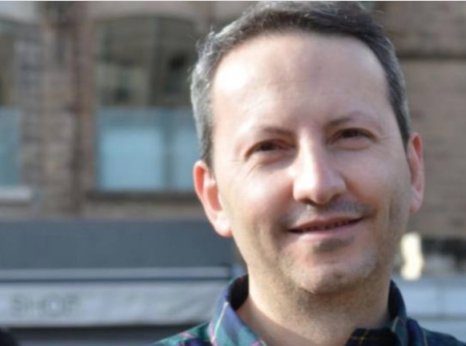Iran: Forcibly Disappeared Swedish-Iranian At Risk Of Execution

Since the Iranian authorities began subjecting Ahmadreza Djalali to enforced disappearance, his family and lawyers have repeatedly gone to multiple offices, including of the prosecution and Evin prison, in order to obtain information about his fate and whereabouts but either told to go to a different office or told there is no information available. In mid-September 2025, according to an informed source, Evin prison officials said that he is not being held there and that only the prosecutor (dadsetan) on his case can make decisions on access to him.
In a letter written from prison in August 2017, Ahmadreza Djalali said that following arrest he was subjected to torture and other ill-treatment in order to force him to “confess” to being a spy, including threats to execute him, kill or otherwise harm his children, who live in Sweden, and his mother, who lived in Iran and died in 2021. In the same letter, Ahmadreza Djalali wrote that he was held solely because of his refusal to use his academic ties in European institutions to spy for the Iranian authorities. Ahmadreza Djalali was sentenced to death for “corruption on earth” (efsad-e fel-arz) in October 2017 after a grossly unfair trial before a Revolutionary Court which relied primarily on “confessions” that Ahmadreza Djalali said were obtained under torture and other ill-treatment while he was held in prolonged solitary confinement and denied access to a lawyer. Amnesty International has repeatedly held that “corruption on earth” fails to meet requirements for clarity and precision needed in criminal law. On 9 December 2018, his lawyers learned that the Supreme Court had upheld his death sentence without granting them the opportunity to file defence submissions. In May 2022, Ahmadreza Djalali’s lawyers filed a request for judicial review to the Supreme Court and, separately, an appeal to the head of judiciary under Article 477 the Code of Criminal Procedure to order a review of the case; no responses have been received over three years later. Throughout Ahmadreza Djalali’s arbitrary detention, Iranian authorities denied him access to timely and adequate health care. In 2025, Ahmadreza Djalali’s health deteriorated further and on 9 May 2025, he suffered a heart attack and was not provided medical care until the prison medical clinic opened five hours later, and then denied him the specialized care he required until 10 May following international interventions, including public calls from human rights organizations and activists as well as intervention from Sweden’s Minister of Foreign Affairs. Following this, authorities again denied him access to timely and adequate health care, including follow up examinations on his heart. Amnesty International has previously warned that Iranian authorities held Ahmadreza Djalali hostage and threatened to execute him to compel third parties to swap him for former Iranian officials convicted and/or on trial abroad as well as to refrain from future prosecutions of Iranian officials. The circumstances of the pardon that the Swedish government provided Hamid Nouri, a former Iranian official convicted and sentenced in 2022 to life imprisonment for his role in the 1988 prison massacres in Iran, and his return to Iran from Sweden on 15 June 2024 confirmed Amnesty International’s earlier concerns that the Iranian authorities were holding Swedish nationals hostage to swap them for Hamid Nouri.
Ahmadreza Djalali is a medical doctor and academic who was living in Sweden and was also a visiting professor in disaster medicine at the Vrije Universiteit Brussels. Following arrest, he was held in Evin prison for seven months in section 209, under the control of the Ministry of Intelligence, which included three months in prolonged solitary confinement, without access to a lawyer. In November 2017, the UN Working Group on Arbitrary Detention called on Iranian authorities to release him and accord him an enforceable right to compensation and other reparations. The Working Group found that his right to a fair trial had been violated so gravely “as to give Mr Djalali’s deprivation of liberty an arbitrary character”. From late November 2020 to early April 2021, Ministry of Intelligence agents tortured and otherwise ill-treated Ahmadreza Djalali while he was held incommunicado in prolonged solitary confinement in section 209. During this time, Ministry of Intelligence agents kept a bright light on in his cell 24 hours a day, which he said caused him great mental distress, and forced him to sleep on the floor on a thin blanket for over five months.
Since the Woman Life Freedom uprising in 2022, the authorities have weaponized the death penalty to instil fear among the population. After the escalation of hostilities between Israel and Iran in June 2025, Iranian officials, including Gholamhossein Mohseni Eje’i, the head of judiciary, called for expedited trials and executions for “supporting” or “collaborating” with hostile states, including Israel. Since 13 June 2025, at least 10 men have been arbitrarily executed on politically-motivated charges and/or accusations of espionage for Israel, including Babak Shahbazi on 17 September 2025 after he was sentenced to death by a Revolutionary Court in May 2025 following a grossly unfair trial. Amnesty International opposes the death penalty in all cases without exception regardless of the nature of the crime, the characteristics of the offender, or the method used by the state to kill the prisoner. The death penalty is a violation of the right to life and the ultimate cruel, inhuman and degrading punishment.